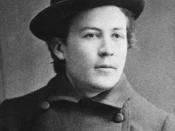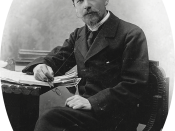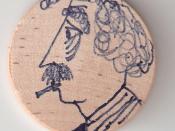Reoccurring Themes This English assignment to some people, or perhaps just me, seems like something that almost turns personal. We were asked to choose three different stories within this book that have a reoccurring theme. I wanted to pick a theme that meant something to me. I choose a theme that deals with following what you believe in, your heart if you will, rather than what other people want or expect you to do.
Though I picked my own theme that meant something to me, perhaps other people feel that same way, because I didn't have to look very far to find them. All of my chosen stories were contained in a book we were reading in my class, and all of them, in many variations, stay true to this theme, and are, with a little reading, right there for the reading.
One story that really reflected this was Chee's daughter.
Within this story a Navajo Native American man named Chee's wife dies. It was custom that the single husband is to turn his children over to his wives parents. " "ÃÂThe Little One! Mother, where is she?'... "ÃÂYou wife's people came after her this morning. They heard yesterday of their daughters death through the trader at Red Sands.' ."� (Platero 68). Unfortunately Chee's daughter, Little One, is very close to him and it is impossible for him to give her away.
When he here's of this he is too heartbroken to just listen to tradition, he knows she is best with him. "Custom! When did my wife's parents begin thinking about custom?... Perhaps I can overtake them. Perhaps they don't realize how much we want her here with us."� (Platero 68). Though his parents-in-law, his mother and even his own culture tells him taking his daughter back is socially wrong, that doesn't matter to him.
It hurts Chee even more when he sees how his father-in-law exploits their culture, and Little One. "More tourists stood in knot before hogan where the sign said: See inside a Real Navajo Home 25ÃÂâ. Then the knot seemed to unravel as a few people returned to their cars; some had cameras; and there against the blue door Chee saw Little One standing uncertainly."� (Platero 69) Soon, however, things all go downhill for Old Man Fat, his wife, and little one. The main road that passes by his home has been replaced by a quicker root, and people do not stop at the tourist spot. Chee takes almost all his farmed food and brings it to them in one last bargain for his daughter. " "ÃÂThere is almost enough food here to last all winter.' Old man fat's wife sought the eyes of her husband. Chee said "àI mean it to be enough. But that was when I thought you might send Little One back with me.'... "ÃÂI am sorry you feel you cannot bear to part with her.'... For in that moment Little One ceased to be their daughter's daughter and became just another mouth to feed."� (Platero 74-75) And so, though not following what was considered "right"� in his culture, Chee road back home with his daughter. He was still happy, and still felt he did the right thing, followed his heart.
The next story is about a man who, within a situation that is considered torture, realizes what is more important to him and shocks everyone.
This story is called The Bet where a man takes an offer to live in isolation for fifteen years, to prove that jail is better than death, and is also offered two million dollars if he can stay. " "ÃÂIt's not true! I bet you tow million dollars you wouldn't stay in solitary confinement for five years.' "ÃÂIf you mean that in earnest,' said the young man, "ÃÂI'll take the bet, but I would stay not fifteen years.' ."� (Chekhov 138) So as shown the man takes the bet. He is trapped in the house for fifteen years, with no social contact. The man, is however, given any books of his choice, and through all this reading becomes very smart, and perhaps even learns somethings about himself. All of his knowledge was discovered in a letter written by the man, which is found by the other man in the bet just before he is about to kill him. "To prove to you in action how I despise all that you live by, I renounce the two millions of which I once dreamed as of paradise and which I now despise. To deprive myself of the right to the money I shall go out five minutes before the time fixed, and so break the compact..."� (Chekhov 142).
And so he does. He is seen by the then shocked watchman leaving the house five minutes before the time he was suppose to stay, and instead of doing the expected and getting the money, being famous and rich, does what he feels is right and leaves.
The next story is perhaps the most extreme example of following you own path. It is called Harrison Bergeron, and talks about a man, of which is the title, who lives in a society where everyone is forced to be equal. This is well shown in the beginning when Harrison's parents watched the television. "(George tried to think a little about the ballerinas. They weren't really very good- no better than anybody else would have been, anyway. They were burdened with sash weights and bags of birdshot, and their faces were masked, so that no one, seeing a free and graceful gesture or a pretty face, would feel like something the cat drug in."� (Vonnegut 159).
Everyone was forced to live like this, handicaps covered their body to make them weak and equal. Headsets were attached to them that let out terrible noises to block their thoughts. One man in perticular was so special that he was imprisoned for being so strong and athletic, Harrison, but was allowed himself one day of freedom.
Walking into the TV station he takes of his handicaps and tells everyone he is an Emperor, and allows one ballerina to be his Empress. "And then, in an explosion of joy and grace, into the air (Harrison and his Empress) sprang!... And then neutralizing gravity with love and pure will, they remained suspended in air inched above the ceiling, and they kissed each other for a long, long time."� (Vonnegut 161).
This was however short lived, when Diana Moon Glampers, the handicapped general arrives at the studio. "(She) came into the studio with a double-barreled ten-gauge shotgun. She fired twice, and the Emperor and the Empress were dead before they hit the floor."� (Vonnegut 161).
So Harrison, like many of the other characters, lived his own way, did what he wanted, or what was right, almost always in the sake of what he dreamed or felt in his heart.
Work Cited Platero, Juanito. "Chee's Daughter."� Adventures in Appreciation. Ed. Frannie Safier. Orlando, FL.
Harcourt Brace Jovanvich, 1986 (65-75) Chekhov, Anton. "The Bet."� Adventures in Appreciation. Ed. Frannie Safier. Orlando, FL.
Harcourt Brace Jovanvich, 1986 (137-142) Vonnegut, Kurt. "Harrison Bergeron."� Adventures in Appreciation. Ed. Frannie Safier. Orlando, FL.
Harcourt Brace Jovanvich, 1986 (158-162)





